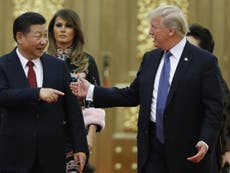It’s no wonder China's Xi Jinping is winding down anti-corruption efforts – they’ve barely made a dent
Genuinely radical reform is off the table and questions about the fundamental role of the CCP in governing China are certainly not allowed
Politics is not just about dealing with facts. It’s about the stories that get told to place those facts in context. Successful politicians subsequently don’t just rely on the real world talking for itself – they tell stories about it. They develop narratives that help them convince the watching world.
Nowhere is this truer than in attempts to tackle corruption. Understandings of what corruption is, what causes it and indeed what can and should be done about it are (at times hotly) contested. There is no simple toolkit that those who are serious about combatting graft can call upon. In that context, storytelling becomes even more important – it helps you explain what you’re doing, why you’re doing it and why others should support you in that endeavour.
When Xi Jinping became general secretary of the Chinese Communist Party (CCP) in 2012 he quickly started developing anti-corruption narratives. He wanted to tackle corruption for, so he proclaimed, the gravest of reasons. At the opening of the first party congress where he was in the hotseat in November 2012, he noted solemnly that if left unchecked corruption could "kill the party and ruin the country".
The tone in his speeches and statements is nonetheless gradually beginning to change. In a statement published in mid-December 2018, for example, Xi declared his campaign a "crushing success". Indeed, it is sounding ever more like he wants to begin winding down an anti-corruption drive that has seen well over 100,000 people – including some very high profile party members – end up behind bars.
Whether Xi’s anti-corruption campaign has succeeded is debatable. Today, Transparency International, one of the world’s leading anti-corruption NGOs, published its annual Corruption Perceptions Index (CPI). If one were to take that as a guide, then it looks as if it’s been more a damp squib than a cause for national celebration.
Back in 2012 China scored 39 out of 100 (the nearer to 100, the lower the perceived levels of corruption). By 2017 the country’s score had improved, but only by two points (to 41). In the intervening period the scores varied between 36-40. The newest data has China coming in at 39 again; precisely where it was when Xi took over.
The data that Transparency International produces is not without its critics. These are, after all, perceptions of corruption and what we perceive to be true often turns out not to be. Boiling down a country’s score to one simple number is also regarded by some as a case of reductionism on steroids.
That China still has deep-rooted corruption challenges is nonetheless not contested. So, why is Xi thinking about winding down his anti-corruption drive? Given that genuinely radical reform is off the table – questions about the fundamental role of the CCP in governing China, for example, are certainly not allowed – it may be that he has simply run out of stories to tell to his internal audience.
During his time in office he has developed four distinct anti-corruption narratives. First, he has periodically recalled Confucian norms of loyalty, responsibility and morality, both to China and indeed the CCP. Loyal, responsible and moral people do not act corruptly. The aim was to press the moral button and to illustrate that tackling corruption was simply the right thing to be doing.
He has also drawn on a second, rather different, narrative from China’s history. That history is one of changing dynasties. Xi is not alone in claiming that these dynasties fail if they do not maintain standards of probity. If people at all levels of the Chinese administration are corrupt, then China could quite plausibly have state failure on its hands. History, so Xi infers, tells us so.
The anti-corruption drive has also been framed in totally different terms. Xi has always been keen to stress that good economic management involves high standards of corporate governance. And few, inside or outside China, would disagree with him. Given that much of the CCP's legitimacy is based on the economy doing well then pressing these buttons makes a lot of sense.
Finally, China’s very own notion of the “Chinese Dream” has periodically been mentioned. This is basically a story of the rejuvenation of the Chinese nation. And corruption isn't part it. China is slowly but surely taking up its role as a globally significant player. A force, so Xi argues, for good in a complex and ever-changing world. Not a force where corruption can be seen to be getting in the way of China taking up its rightful place in global affairs.
These narratives can, of course, overlap and Xi tends to stress different things at different times. But they are all, in their different ways, there if one looks closely enough.
Xi ultimately remains a highly proficient storyteller. For as long as the Chinese are happy to buy these stories, he remains in control. But stories have to be adapted and updated. The reality that people feel needs to find resonance in the stories they are told.
It may just be that in terms of anti-corruption Xi is running out of new ideas that really hit home. Given that, it makes sense for anti-corruption to be slowly moved away from centre-stage in Xi’s world. That may be exactly what we are seeing now.
Dan Hough is a professor of politics at the University of Sussex. He is also director of the Sussex Centre for the Study of Corruption. Yang Wu is a doctoral candidate at the University of Sussex



Join our commenting forum
Join thought-provoking conversations, follow other Independent readers and see their replies